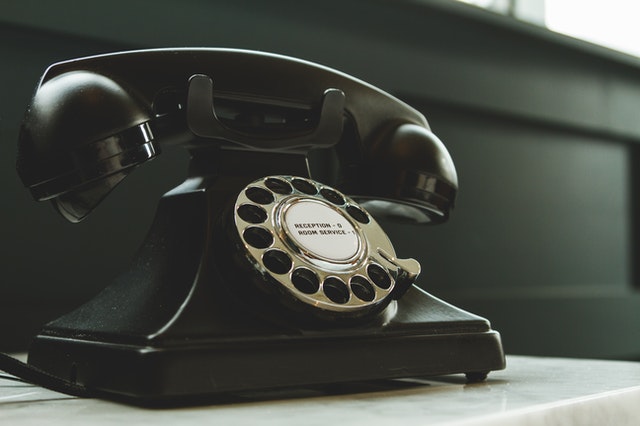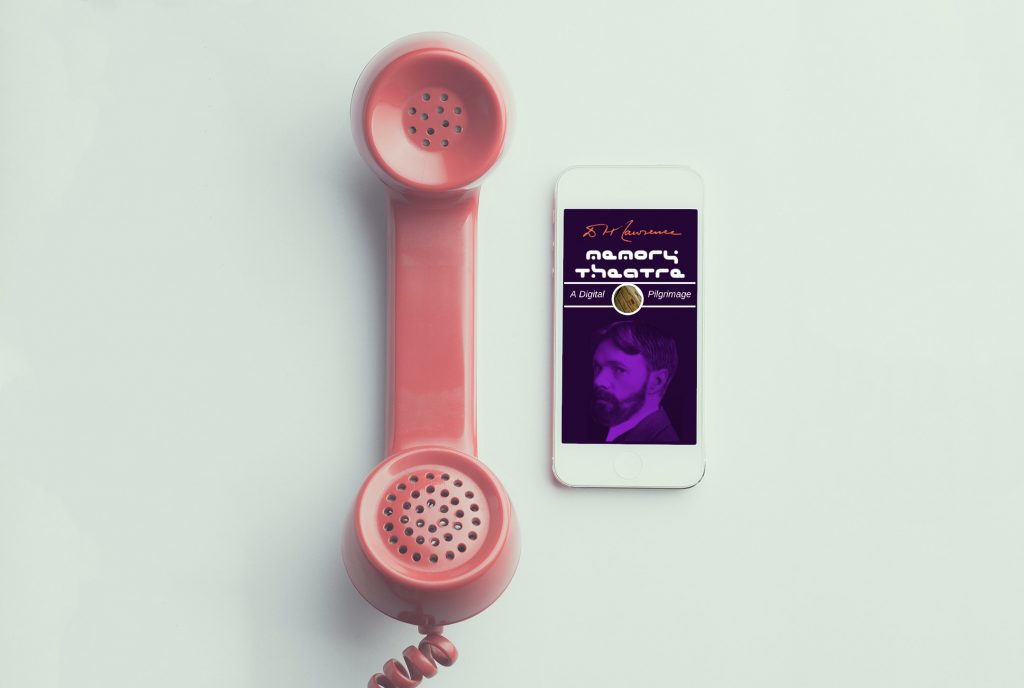
Photo by Chepté Cormani from Pexels.
Photo by chepté cormani from Pexels A recent online exhibition celebrating the telephone in literature saw references from Mark Twain to Christopher Isherwood suggested by the public. We submitted a letter from Lawrence in 1928 concerning his fears over the publication of Lady Chatterley.
‘Hallo, hallo, hallo… I’m afraid not, we have a crossed line, please hang up… Hallo… You have a wrong number… Oh! Hallo…’ – Jean Cocteau, The Human Voice (1930)
‘From the receiver’s ‘black mouth’ in Virginia Woolf’s The Waves (1931) to the ‘five hundred-quid worry bead’ in Will Self’s Phone (2017), telephones repeatedly ring, buzz and ping in modern and contemporary literature’ writes Sarah Jackson, in her introduction to Crossed Lines, which explores the ways that the telephone has been conceived by writers from the 19th century onwards. The exhibition was launched in November 2020 when the telephone took on added importance as one of the main ways of communicating while the government enforced a national lockdown.
Crossed Lines explores the positive and negative possibilities of the telephone within contemporary cultures and communities. Engaging writers, artists, musicians, scientists and members of the public, it incorporates a number of innovative activities including a mobile app, a sound installation in Nottingham, a nationwide student poetry competition, writing workshops and events at the Science Museum in London.
My favourite event was Calling Across Borders, a series of voicemail poems exploring community, loss, resilience, and hope. For this, young refugees left messages for friends and family they would most like to speak to again which was then turned into a short animation which you can watch by clicking this link. This had particular resonance for me as I’ve spent the last two years interviewing Syrian refuges for Whatever People Say I Am and witnessed how What’s App has become integral to families trying to stay connected, functioning as a virtual home.
Crossed Lines explores the implications of telephony from a range of global contexts, considering how literary telecommunications can help us to find new ways of talking and listening across cultures. The exhibition features eighty works spread over 130 years with submissions selected from an open callout.
The earliest example submitted is the aptly named The Telephone (1877) by the American transcendentalist poet Jones Very who can see the utopian possibilities of this new form of global communication: ‘Beneath the ocean soon man’s voice may reach/And a new power be given to human speech’. Less than a year before, Alexander Graham Bell had been awarded his patent. More recent uses include the humorous ‘fellytone’ reference in Harry Potter and the Prisoner of Azkaban (1999) to the more ominous fear of the phone as a surveillance device in Anna Burn’s Booker-winning Milkman (2018)- ‘phones weren’t trusted; indeed we only had one because it had been in the house when we moved in’.
Telephony as a form of surveillance was something Sarah Jackson uncovered at the BT Archives where she discovered two letters from Sylvia Pankhurst that revealed her concerns over ‘duplicate telephone lines’ – wiretapping – 70 years before the Government disclosed her secret surveillance by MI5 to the public.
One of my favourite entries is from Ulysses (1922) where Kinch (Stephen Dedalus) imagines the umbilicus as a telephone cord.
‘The cords of all link back, strandentwining cable of all flesh. That is why mystic monks. Will you be as gods? Gaze in your omphalos. Hello! Kinch here. Put me on to Edenville. Aleph, alpha: nought, nought, one.’
One of the most poignant entries is the poem ‘Last Letter’ (2010) by Ted Hughes which was discovered in Hughes’s archives, twelve years after his death and includes the last lines of Hughes’s final ‘letter’ to Sylvia Plath.
I wasn’t expecting to find any kind of references to telephony in Lawrence’s writing because he was such a prolific letter writer. I just couldn’t imagine him embracing something so immediate, modern and vulgar as a telephone. But to my surprise, his letters revealed otherwise. I submitted the below entry which you can also read online. The submission format involved the relevant quote and then some brief context.
 ‘My dear Enid
‘My dear Enid
Now I’m in more trouble. A beastly firm of book-exporters ordered eighty copies of Lady Chatterley’s Lover—now it turns out that they have a Wesleyan connection—they’ve read the book—and cancelled the order hastily—after Orioli has already posted to them seventy-two copies from Florence. Now unless we’re quick they’ll send the things back to Florence—may even refuse to accept them.—But I warn you, the book is shocking—though, course, perfectly honest and decent.
[…] If you feel like risking it, telephone the Jackson people and ask them if they have copies ready for you to fetch away: say Mr. D. H. Lawrence has asked me—[…] their telephone is Holborn 5824.’
________________________________________
This letter from D.H. Lawrence to Enid Hilton was sent on 29 July 1928 from Kesselmatter, Gstreig b. Gstaad (Bern) Switzerland. Lawrence would be dead a few years later and Lady Chatterley would be banned until 1960. Lawrence was sceptical of technology, particularly that which placed an artificial barrier between people, but here desperation overrides these sentiments. He is almost daring Enid Hilton to call William Jackson Books Ltd, but only if she follows his explicit instructions. Lawrence experienced censorship throughout his short life. This had financial and aesthetic repercussions. Therefore, the telephone has real significance. It represents immediacy, and an opportunity to salvage copies of his novel.
www.crossedlines.co.uk/online-exhibition This post was originally published on The Digital Pilgrimage on 27 September 2021.
Further Reading
- Newly Discovered Letters Reveal Sylvia Pankhurst’s Wiretapping Fears (ntu.ac.uk)
- Interview: Dr Sarah Jackson (ahrc.ukri.org)
- Sherlock and the Smartphone (huffingtonpost.co.uk)
- Crossed Lines – A crowdsourced exhibition capturing the history of the telephone in literature (ntu.ac.uk)
- Milkman to Mark Twain: online exhibition celebrates telephones in literature (theguardian.com)
- D.H. Lawrence Memory Theatre (memorytheatre.co.uk)
